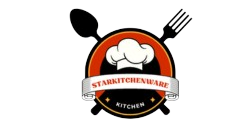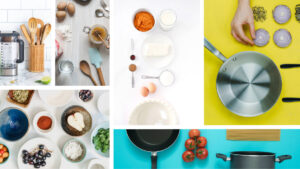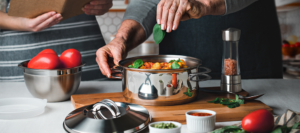Hard anodized cookware is one of the most popular types of cookware in the modern kitchen. People choose this cookware because of its so many great features. This cookware is lightweight, durable, strong, and affordable. Anodized cookware makes the cookware harder than other usual metal cookware products. If you take a little care of your anodized cookware it will give you excellent performance for a long time.
And the most important point is, hard anodized cookware is safe for healthy cooking. Some people are scared to have a hard anodized cookware set because they don’t know how to take care of this cookware. In this article, I will share some most useful tips on how to clean hard anodized cookware including interior and exterior. Let’s check below.
Tips and Tricks on How to Clean Hard Anodized Cookware
If you do not clean your hard anodized cookware appropriately, then it will turn useless in a very short period of time. That is why you have to clean your cookware perfectly to take very good care of it. There are some tips and tricks to clean your anodized pots and pans properly.
Ways to Clean Hard Anodized Cookware Interior
To preserve your anodized cookware properly clean the inside carefully. There are ways on how to clean hard anodized cookware interior just below.
- Use the Right Cleaner
To protect your hard-anodized pots or pans from unexpected damage it is essential to clean the cookware with proper cleaners. Otherwise, your kitchenware would damage within a short time.
- Clean the Cookware with Mild Dishwashing Powder
At first, you need a mild dishwashing powder to clean your hard-anodized cookware. Do not use any harsh detergent to clean non-stick cookware. Harsh detergent could damage the non-stick coating of your pans. Moreover, avoid using alkaline or baking-soda based cleaners on the inside of the hard-anodized cookware.
- Use Mild Scouring Powder
You can use mild scouring powder to clean Hard Anodized Pots And Pans. Scrub the inside of the cookware with non-abrasive sponges, soft-bristled cleaning brushes, scrubby sponges, dishcloths or rags. Do not use steel wool on the surface of the non-stick cookware. Steel wool can cause scratches or damage on the surface of the pans or pots.
- Avoid Use Of Cleaning Solutions that are Not Applicable to Cookware
You must avoid the use of cleaning solutions that are not intended for cleaning your hard-anodized cookware. Do not use oven cleaner or caustic cleaner on your cookware.
Never use any liquid household cleaners such as floor cleaners, grout cleaner, silver polish, or porcelain cleaner. Most of the time these cleaners contain ammonia or bleach which is harmful to hard-anodized cookware nonstick surfaces.
- Wash Cookware before Use
Wash the cookware thoroughly before using it and dry it perfectly. Although if you have new anodized cookware in your kitchen, then it is necessary to wash it before use. You can use warm water and gentle dish soap to clean it simply.
- Allow the Cookware to Cool Completely
Do not sink hot cookware in cold water. Allow your pans or pots to cool completely before washing. Otherwise, cold water can wrap or pervert your hot pans.
There is another useful option for you, you can put your hot pans or pots in hot water and cold pans in cold water. This simple method will prevent your kitchenware from the wrap.
- Clean After Each Use
It is recommended to clean the pots or pans after every use to avoid any unexpected mess. You can clean your hard-anodized non-stick cookware set with water or can wipe with a soaked cloth. It will help you to remove residue from the cookware and will make your pans ready for another use.
- Wash the Pans or Pots with Warm Water and Soap
If you are a user of Calphalon hard-anodized cookware it’s better to clean your cookware traditionally by your hand. You can use warm or hot water and mild dish soap to clean your pots and pans. Or you can wash your kitchenware with mild dishwasher liquid. It would be the best option for you to clean your cookware effortlessly.
However, you can also check the video below to know more details about cleaning Calphalon Hard Anodized Pots And Pans.
- Boil Dish Soap in the Cookware to Remove Very Difficult Stains
If you have very difficult stains or residue on the cookware surface, then you can simmer dish soap in the cookware. Fill up your cookware with water and add some mild dishwasher liquid or soap. Boil it at least for 20 minutes and after boiling leave it for 30 minutes to cool.
Remove the stains or residue with a gentle soft-bristled cleaning brush or scrubbing pad. Rinse thoroughly and wash it with lots of water.
The Processes to Clean Hard Anodized Cookware Exterior
Cleaning the outside of the cookware is the essential part to keep it looks new and shiny. Here are some effective tips on how to clean hard anodized cookware exterior. Check it out to make your Hard Anodized Pots And Pans looks like new.
- Use Baking Powder and Water Solution
Some kinds of hard-anodized cookware are not resistant to scratch so that you have to clean it properly. Scratches can arrive from burnt meals. At this time, baking soda and water solution will help you to protect your cookware from scratch.
Just keep your nylon scrubber in the water and baking soda mixture for half an hour. After that rinse anodized pots or pans carefully and wash them with water.

- Soak your Non-Stick Pans and Pots in Warm Water and Soap
Another option to get rid of stains from anodized cookware is soaking it in warm or hot water and soap. Use a cleaning brush or dishcloth to scrub at the burnt food residue or stains. After that rinse the cookware carefully with water.
Remember one thing, never put your anodized cookware in the dishwasher. Because the dishwasher could make discolor the cookware.
- Use a Gentle Scouring Powder
To remove burnt or stains from the outside of your anodized cookware set, you can use scouring powder and warm water. Use a soft-bristled cleaning brush or gentle scrubbing pad to remove the stain.
Rinse the outside of the pans carefully and wash it with normal water. To season your cookware properly dry it completely after every wash.
Final Thoughts
I hope all of the above tips on how to clean anodized aluminum interior and exterior will help you to clean your cookware properly. Applying all of these methods you can protect your anodized cookware for a long time.
Moreover, hard anodized cookware is different from other ordinary cookware. So, you have to take extra care in order to make it last longer.
One more tip for you, season your anodized non-stick pan with oil, it will be helpful to prevent food from sticking to it. Also, you can restore hard anodized cookware easily following the above process.





